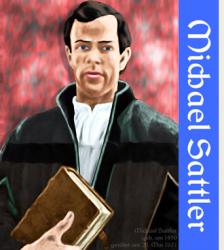Planning worship?
Check out our sister site, ZeteoSearch.org,
for 20+ additional resources related to your search.
- |
User Links
Browse People
Girolamo Savonarola
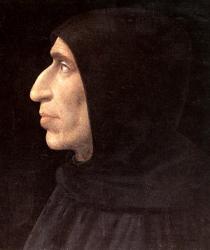
1452 - 1498 Person Name: Girolamo Savonarola, d. 1498 Author of "Jesus, Refuge of the weary" in Common Service Book of the Lutheran Church Savonarola, Girolamo, p. 1533, i. His hymns were printed in a collected form as Poesie di Fra Girolamo Savonarola tratte dall’ Autografo, at Florence, 1862. A number of them had appeared in Fra Serafino Razzi's Laudl Spirituali, Venice, 1563, and elsewhere. The best-known is:—
Giesu sommo conforto. [Passiontide.] This is in 1862 as above, No. xii., p. 27, entitled "Praise to the Crucified." Also in Razzi, 1563, f. 4, in Eugenia Levi's Lirica Italiana Antica, Florence, 1905, p. 118, &c. Translated as "Jesus, Refuge of the weary," by Jane Francesca Wilde. Contributed to R. R. Madden's Life and Martyrdom of Savonarola, 1853, i., p. 376; reprinted in her own Poems by Speranza, Dublin, 1864, p. 199. See further p. 1574, ii. [Rev. James Mearns, M.A.]
--John Julian, Dictionary of Hymnology, New Supplement (1907)
Girolamo Savonarola
Hans Sachs

1494 - 1576 Composer of "WACHET AUF" in Voices United Sachs, Hans, the famous German poet and shoemaker, was born at Nürnberg, Nov. 5, 1494; settled there in 1516 after his journeyman wanderings, and d. there on the evening of Jan. 19,1576 (see full notices in K. Goedeke's Grundriss, vol. ii., 1886, pp. 408-437; Allg. Deutsche Biographie, xxx., 115, &c). His poetical works were collected at Nürnberg in 3 vols., folio, 1558-61 (vol. 4, 1578; vol. 5, 1579); and a complete ed. of his works is now being published by the Literary Union of Stuttgart, of which vol. xvii. appeared in 1888. His pre-Reformation hymns are given by Wackernagel, ii., Nos. 1403-1410 ; and his post-Reformation hymns by Wackernagel, iii., Nos. 83-106. Two of his hymns (Wackernagel, iii., Nos. 83, 97) have been translated by Bp. Coverdale, 1539 (see p. 442, ii., Nos. 16, 27); and two others (Wackernagel, iii., Nos. 86, 82) by Miss Winkworth, 1869, pp. 131,134. See also p. 1234, i., and p. 1543, ii. [Rev. James Mearns, M.A.]
--John Julian, Dictionary of Hymnology, Appendix, Part II (1907)
Hans Sachs
Sir, Edwin Sandys
1561 - 1629 Person Name: Edwin Sandys Author of "In Pilgrim Life Our Rest"
Sir, Edwin Sandys
George Sandys
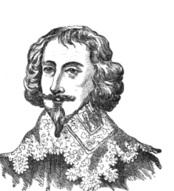
1577 - 1643 Author of "Savior of mankind, man, Emmaneul" Sandys, George, son of Dr. Edwin Sandys, Archbishop of York, was born at Bishopthorpe Palace, York, in 1577, and educated at St. Mary Hall and Corpus Christi College, Oxford. For some years he devoted himself to travelling in Europe and Asia, and published in 1615 a curious account of his experiences. After visiting America, where he was for a time the Treasurer of the British Colony of Virginia, he became, on his return, a Gentleman of the Privy Chamber of Charles I. He died at Bexley Abbey, Kent, March 1643. His publications included his Traveller's Thanksgiving; the prose work on his travels, A Relation of a journey begun in 1610, &c, 1615; a translation of the Metamorphoses of Ovid; and Grotius's tragedy of Christ's Passion. His productions which most nearly concern hymnology were:—
(1) A Paraphrase upon the Psalmes of David, and upon the Hymns dispersed throughout the Old and New Testaments. London: at the Bell in St. Paul's Churchyard. MDCXXXVI.
(2) A Paraphrase upon the Divine Poems by George Sandys. London: at the Bell in St. Paul's Churchyard. M.DCXXXVIII. This volume contained the Paraphrase of the Psalms, paraphrases upon Job, Ecclesiastes, the Lamentations of Jeremiah, and the Songs collected out of the Old and New Testaments.
(3) His paraphrase of The Song of Solomon was published in 1642. The most available form of these works is the Rev. R. Hooper's reprint of Sandys's Poems, in Smith's Library of Old Authors.
A few only of Sandys's versions of the Psalms are found in modern hymnbooks, although they were set to music by Henry Lawes. His influence, however, upon later paraphrasers was considerable. The following, together with a few others annotated under their respective first lines, are in common use:—
1. How are the Gentiles all on fire. Ps. ii.
2. Lord, for Thee I daily cry. Ps. lxxxiv.
3. My God, Thy suppliant hear. Ps. lxxxvi.
4. Praise the Lord enthroned on high. Ps. cl.
5. Sing the Great Jehovah's praise. Ps. lxvi.
6. Thou, Lord, my witness art. Ps. cxxxi.
7. Thou who art [dwellest] enthroned above. Ps. xcii.
8. You, who dwell above the skies. Ps. cxlviii.
These paraphrases as in common use are in the form of centos.
--John Julian, Dictionary of Hymnology (1907)
====================
Sandys, G.., p. 994, i. Another cento from his Paraphrase upon the Psalmes of David, &c, 1638, as "Let God, the God of battles, rise" (Ps. lxviii.), is in the Hymn Book for Use in Wellington College, 1902.
--John Julian, Dictionary of Hymnology, New Supplement (1907)
George Sandys
Johann Säubert
1590 - 1646 Author of "Es donnert sehr, o lieber Gott" Also Johann Saubert and Johann Säubertus
Johann Säubert
Nicholas Saboly
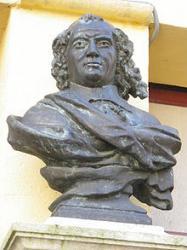
1614 - 1675 Person Name: Saboly, 17th c. Composer (attributed to) of "BRING A TORCH" in The Celebration Hymnal Nicholas Saboly was born on January 30, 1614 in Monteux, France.His father died when he was 5 and at that time he was sent to the Jesuit school at Carpentras, which had been the seat of Pope Clement V for one year in 1313. After finishing his studies at Carpentras, Saboly studied theology at the University of Avignon.
In 1633, Saboly became chaplain in the cathedral Saint-Siffrein de Carpentras. He never completed hist studies at Avignon. Nevertheless, he was ordained sub-deacon, deacon, and priest in the Roman Catholic church.
In 1639, Saboly was given the post of organist and chapel master at the Carpentras cathedral.He later returned to Avignon where he was given the post of organist at Saint-Pierre d'Avignon.
Saboly is best remembered for his composition of Mass settings and Christmas carols. He died on July 25, 1675, in Marseille, France.
(Source: Wikipedia France)
Nicholas Saboly
Claude de Santeul
1628 - 1684 Author of "Now, My Soul, Thy Voice Upraising" Santeüil, Claude de, elder brother of Jean-Baptiste de Santeüil, was born in Paris, Feb. 3, 1628. He became a secular ecclesiastic of the Seminary of St. Magloire, Paris, whence he was also known under the Latin-ized form of his name as Santolius Maglorianus. He died Sept. 29, 1684. Like his brother, he was a good writer of Latin poetry, and some hymns by him were included in the Cluniac Breviary, 1686, and the Paris Breviaries of 1680 and 1736. Some of these hymns have been translated into English, and are in common use in Great Britain. [George Arthur Crawford, M.A.]
--John Julian, Dictionary of Hymnology (1907)
Claude de Santeul
Jean-Baptiste de Santeul
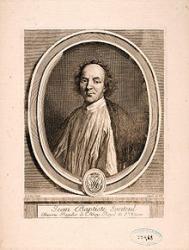
1630 - 1697 Person Name: Jean de Santeüil Author of "Our Lord the Path of Suff'ring Trod" in The Cyber Hymnal Santeüil, Jean-Baptiste de, was born in Paris of a good family on May 12, 1630. He was one of the regular Canons of St. Victor, at Paris, and, under the name of Santolius Victorinus, was distinguished as a writer of Latin poetry. Many of his hymns appeared in the Cluniac Breviary 1686, and the Paris Breviaries 1680 and 1736, and several have been translated into English, and are in common use in Great Britain and America. He was very jocose in disposition and singular in his habits. When on a journey he died at Dijon, Aug. 5, 1697. His Hymni Sacri et Novi were published at Paris in 1689, and again, enlarged, in 1698. [George Arthur Crawford, M.A.]
--John Julian, Dictionary of Hymnology (1907)
Jean-Baptiste de Santeul
Gottfried Wilhelm Sacer
1635 - 1699 Author of "Ach, was hab ich angerichtet" in Sammlung von geistlichen Liedern ... kirchlicher und haeuslichen Gottesdienst Sacer, Gottfried Wilhelm, son of Andreas Sacer, senior burgomaster of Naumburg, in Saxony, was born atNaumburg, July 11, 1635. He entered the University of Jena in 1653, and remained there for four years as a student of law. He was thereafter for two years secretary to Geheimrath von Platen, in Berlin; and then tutor, first to a son of the Swedish Regierungsrath von Pohlen, and then to the sons of the Saxon Landhauptmann von Bünau. In 1665 he entered the military service under Herr von Mollison, commandant at Lüneberg, at first as regimental secretary, and afterwards as ensign. Soon tiring of this he went to Kiel in 1667, in order to graduate LL.D., but before doing so undertook a tour in Holland and Denmark with some young noblemen from Holstein. In 1670 he settled down as advocate at the appeal and chancery courts in Brunswick (graduating LL.D. at Kiel in 1671), and in 1683 removed to Wolfenbüttel as Kammer-und Amts-advocat, receiving the title of Kammer-Consulent in 1690. He died at Wolfenbüttel, Sept. 8 [18], 1699. (Weizel, iii. p. i.; Koch, iii. 398, iv. 562, &c.)
Sacer began early to write poetry, was admitted by Rist, in 1660, as one of his poetical order of Elbe Swans, and in hisNützliche Erinnerungen wegen der teutschen Poeterey, Altenstettin, 1661 [Wolfenbüttel Library], already described himself as " Kayserlicher Poët," i.e. as having been crowned as a poet by the Emperor of Austria. His hymns are among the best of the period immediately succeeding Gerhardt. They have a considerable measure of poetic glow, and sometimes of dramatic force, and are Scriptural and good in style. His earliest hymns seem to have appeared in hisBluttriefende, siegende und triumphirende Jesus, 1661, but no copy of this work is now known. Many are included in pt. ii. 1665, of the Stralsund Gesang-Buch (Ander Theil des erneuerten Gesang-Buchs), and in the other hymn-books of the period. They were collected and published by his son-in-law as his Geistliche, liebliche Lieder, at Gotha, 1714.
Those of Sacer's hymns which have passed into English are:—
i. Durch Trauera und durch Plagen. New Year. Included in 1665 as above, pt. ii. p. 35, in 7 stanzas of 8 lines; repeated 1714, p. 3, entitled "On the New Year." It is also in the Berlin Geistliche Lieder ed. 1863, No. 191. The translation in common use is:—
Through many changeful morrows. This is a good tr. by Dr. F. W. Gotch, in the Baptist Magazine, Jan. 1857, p. 19, repeated in the 1880 Supplement to the Baptist Psalms & Hymns.
ii. Gott fähret auf gen Himmel. Ascension. Founded on Ps. xlvii. 6-7. Included in 1665, as above, pt. ii. p. 147, in 7 st. of 8 1., and repeated 1714, p. 27, entitled "On the Ascension of Christ." It is also in the Berlin Geistliche Lieder, ed. 1863, No. 336. In the Württemberg Gesang-Buch, 1842, it begins, "Der Herr faint auf." The translations in common use are:—
1. Lo! God to heaven ascendeth. This is a good tr., omitting st. vi., by Miss Cox, in her Sacred Hymns from the German, 1841, p. 39 (Hymns from the German, 1864, p. 63). Repeated, abridged, in Alford's Psalms & Hymns, 1844, and his Year of Praise, 1867; in Dale's English Hymn Book, 1874, &c.
2. While up to Heaven God goeth. A spirited version, omitting st. vi., by W. J. Blew, printed as a leaflet for choir use in 1846, and included in his Church Hymn & Tune Book, 1852 ; in Rice's Selection from Blew, 1870, No. 67, and in Lyra Messianica, 1864, p. 3fr2.
Other hymns by Sacer are:—
iii. Gott, der du aller Himmel Heer. For those at Sea. Included in J. Crülger's Erneuerte Gesangbüchlein ...von Peter Sohren , Frankfurt am Main, 1670, No. 878, in 10 st., and repeated, 1714, p. 75, in 11 St., entitled “Hymn for Seafarers." Recently in Knapp's Evangelischer Lieder-Schatz 1837 and 1865. Translated as, "Thou who hast stretched the heaven's blue sky." In L. Rehfuess's Church at Sea, 1868, p. 34.
iv. Lass mich nicht in Irrthum fallen. Christ for all. Included, 1714, as above, p. 53, in 10 st. of 8 1., founded on Ps. li. 13, and repeated in the Hannover Gesang-Buch, 1740, No. 848. Tr. as "Lord, forbid that e'er such error." By Dr. J. Guthrie, 1869, p. 117.
v. 0 dass ich könnte Thränen gnug vergiessen. Passiontide. Included in 1665 as above, pt. ii. p. 60, in 16 st. of 4 1., and repeated, 1714, p. 20, entitled "Contemplation of the piteous death of Jesus Christ." In the Berlin Gesang-Buch, 1829, st. xiv.-xvi. altered and beginning, “Mein Herr und Heiland, lass mirs gehn zu Herzen," are included as No. 189. This form is tr. as, “Lord, touch my heart with that great Consummation," by N. L. Frothingham, 1870, p. 143.
vi. So hab' ich obgesieget. Funeral of a Child. Included in 1665 as above, pt. ii. p. 665, in 13 st. of 8 1., st. i.-xii. being given as spoken by the child in Paradise, and xiii. as the answer of the bereaved parents. Re¬peated,in 1714, p. 91, entitled "Comfort from the de¬parted to those left behind," the 13th stanza being entitled “Farewell of the sorrowing ones." Recently as No. 855 in the Evangelischer Lieder-Schatz, 1851. Translated as (1) "Lo! now the victory's gain'd me," by Miss Cox, 1841, p. 77. In her edition of 1864, p. 87, it is altered and begins, "My race is now completed." (2) "Then I have conquer'd; then at last," by Miss Winkworth, 1855, p. 243. (3) "My course is run; in glory," by Dr. J. Guthrie, 1869, p. 105. [Rev. James Mearns, M.A.]
--John Julian, Dictionary of Hymnology (1907)
Gottfried Wilhelm Sacer


 My Starred Hymns
My Starred Hymns